Robert Knox's Blog, page 24
January 10, 2018
The Garden of Verse: Looking Ahead, and Back, in January's Poems
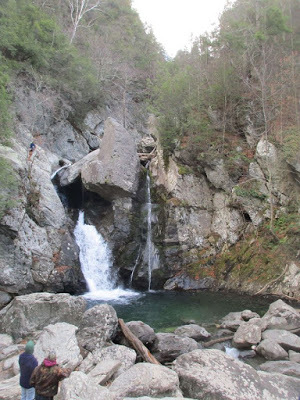 My poems in the January 2018 issues of Verse-Virtual look at the recent past, the anticipated future, and a recollection (with some nostalgia) for a distant decade.
My poems in the January 2018 issues of Verse-Virtual look at the recent past, the anticipated future, and a recollection (with some nostalgia) for a distant decade. The recent past for me is the autumn of 2017, and my poem They Fell Without Color is my attempt to deal with the diminished state (and in some cases pure absence) of the typical New England autumnal color that essentially defines the turn of the year from growing season to freezing season. I'm not talking principally about the mountains of New England or the Berkshire Hills, where color was significantly muted but not absent. I'm talking about the street where I live, my neighborhood, my Greater Boston regional location. My own backyard.
This was a home truth to me. Some weather pattern, a little too warm at the start, too cold at the end, a second consecutive dry season -- whatever the causes, the season was out of sorts.
They Fell Without Color seeks to register that sense of loss. Here's the final stanza:
They fell in the morning, were gone by the eve
No eye marked their turning, by nightfall they leave
They drop like the hour, the loss of the sun
They drop like the rainstorm, dark to our sight
They wrinkle and brown and crumble and fall
And scuttle in gutters, a brown boneless ball
And leave us alone through a long starless night
To ponder a year with the season undone
To read the whole poem, and my other two poems, see: http://www.verse-virtual.com/robert-k...
The poem that deals with a more distant past is titled
That 70's Photo. The photo I used to illustrate the poem (seen above) is a view of Bash Bish Falls taken much more recently, back in November, on a visit to the picturesque spot on the Massachusetts and New York border. The visit, our first there in many years, reminded me of wheeling a stroller down that wooded path back in the late seventies when our first child, Sonya, was traveling on wheels rather than on toddler legs. The poem describes that path in this excerpt:
The long leafy way, like a carriage drive
designed for an 18th century gathering
of French grandees costumed as peasants...
The poem that looks to the future is based on dire report on the future of planet Earth offered in the highly regarded book "The Sixth Extinction" by Elizabeth Kolbert, which I read a few years ago. Titled Sixth Extinction, my poem is largely a 'list poem' addressing the question of what will be lost in the coming, and widely predicted, die-off. Here's an excerpt:
What will disappear?
Toasters, roller coasters
Piled books on the night-table library,
the ever-unread and the old favorites tumbled together,
Star fish, sea urchins, the nautilus cephalopod
Snow-salted East End streets on "Call The Midwife"...
Not to end on a pessimistic note, hardly any other poems in January's Verse-Virtual are about the end of the world. To see for yourself, go to http://www.verse-virtual.com/poems-an...
Published on January 10, 2018 12:50
January 9, 2018
Garden of the Seasons: The Last Days of Christmas... Big Snow, Small Temps, and the Moderately Absurd Struggle to Take Out the Trash
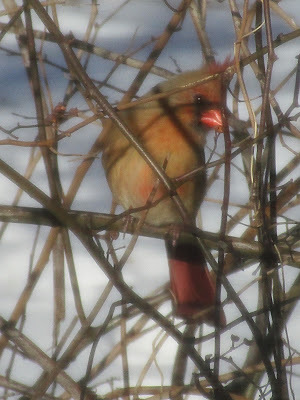
On the Eighth Day of Christmas (Jan. 1, in calendar terms) the reality of the new year was settling in. (See the first seven days at http://prosegarden.blogspot.com/2017/... )
Since the day was a national holiday, offices were closed, work options slim, all possibility of outdoor exercise laughingly obliterated by subprime temperatures unexperienced in the last century, the domestic celebration of the holiday season was reduced to two hours in the local Y. This lengthy holiday period was beginning to wear, overlapping as it did the metaphysical question of meteorological nonbeing: what does it mean to be below zero? To add a particular frosting (in the icy sense) on our predicament, it turned out that our local YMCA had proved a popular magnet, serving for everybody else's holiday port of last resort. The joint was jumping. The machines were humming. As a rule I begin my workout routine with a warming bout of stationary cycling. Approaching the exercise device-room clatter, though happily the metal-freak had not been allowed to pump his favorite torments through the crowd-control amplifier this busy afternoon, I was confronted by a rank of stationary cycle machines fully occupied in whole-hearted, and no doubt resolute, efforts to draw off those calories: Eight Maids A-Milking.
 You will permit Day Nine to be a little less festive. The world of work has resumed, zooping Anne out of the house at an early, arctic hour. My own interest centered on the progress of the most intriguing of my holiday season gifts, the indoor seed-starting kit that includes a substantial tray, three little square-bottomed metal planters, five packets of tiny herbal seeds (cilantro, for example, fall somewhere between microscopic and invisible), three label-sticks that resemble what you have when you finish licking your creamsicle. All this is accompanied by a grow-light unit that, when attached to a narrow ledge beneath a window, shines with a hot-pink fury that not only makes me want to stand up and grow, but glows through both the parlor and out onto the darkened street. A sure sign, no doubt, to passersby that they are entering a hot pink-light district. Summon the Nine Dancing Ladies. On the Tenth Day -- has it really been so long? -- we are taking advantage of a virtual thaw to explore new transportation options. The greater regional transportation, the notorious MBTA, having graciously created this opportunity for exploration by deciding to close down the nearby Wollaston train station for a modest two years to do a few long-delayed repairs and figure out how to build the elevator they have been putting off for 27 years since the passage of American Disabilities Act. This tardy decision gave Anne, who ordinarily trains from the nearby station, the opportunity to sample the MBTA's bus transportation system. Of which we have all heard so much.
You will permit Day Nine to be a little less festive. The world of work has resumed, zooping Anne out of the house at an early, arctic hour. My own interest centered on the progress of the most intriguing of my holiday season gifts, the indoor seed-starting kit that includes a substantial tray, three little square-bottomed metal planters, five packets of tiny herbal seeds (cilantro, for example, fall somewhere between microscopic and invisible), three label-sticks that resemble what you have when you finish licking your creamsicle. All this is accompanied by a grow-light unit that, when attached to a narrow ledge beneath a window, shines with a hot-pink fury that not only makes me want to stand up and grow, but glows through both the parlor and out onto the darkened street. A sure sign, no doubt, to passersby that they are entering a hot pink-light district. Summon the Nine Dancing Ladies. On the Tenth Day -- has it really been so long? -- we are taking advantage of a virtual thaw to explore new transportation options. The greater regional transportation, the notorious MBTA, having graciously created this opportunity for exploration by deciding to close down the nearby Wollaston train station for a modest two years to do a few long-delayed repairs and figure out how to build the elevator they have been putting off for 27 years since the passage of American Disabilities Act. This tardy decision gave Anne, who ordinarily trains from the nearby station, the opportunity to sample the MBTA's bus transportation system. Of which we have all heard so much.
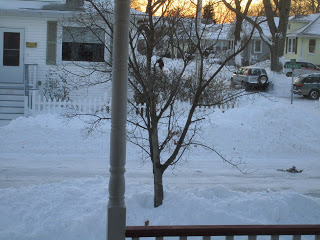 We spend the day with fingers crossed. Tonight we will learn the success (or otherwise) of this new throw in the game of commutation. If it does not go as planned, if the conveyance, say, fails to arrive on schedule to rescue those who shudder at the roadside in chilly dawning expectation of its momentary appearance, the powers that be will hear about it. Who be these powers? The Lord Duke of Baker, the Lord Overseer of the Duchy of MBTA, Quinzee's Lord Mayor of Coquetry, plus seven of the (good-lord, are they really?) city council sitters. And we will do our best to set these Ten Lords A-Leaping. As for self, in celebration of the day's heat wave spiking temps into the upper twenties, I mobilize local transport to pry around the neighborhood in search of simple needs; a planner for the now three-day old year of 2018. (Struck out.) A parking space near the local library (got lucky). A visit to the High Church of Coffee with the Best Bagels. (Reliable as ever). A longer foray to an emporium of general merchandise (still need the planner); abandoned for lack of faith. But my perseverance had earlier been rewarded when the High Church of Coffee proclaimed a divine intervention to bless me with a free four-dollar coffee. A troubling gift: do I really pay four dollars for coffee? And when will the dubious gifts of this grateful season stop coming? On the Eleventh Day we are gifted from heaven by fourteen inches (and counting) of fresh white celestial product. I'm not sure who ordered it, or why so much. Is this what happens when I press the wrong button, or press the right button twice, on one of those many Amazon-like purchase sites. I recently donated the value of our house to the Massachusetts branch of the ACLU by entering some other value (mobile phone number?) in the wrong place. Good-humoredly, they gave us most of it back, but warned me not to do it again. Sue me, I said. But nobody, I fear, is taking back this snow. Considering our recent temperatures have been lower than those in most of Alaska, I sense a theme of misdirection in our weather that is seriously imperiling the festive mood of these last Days of Christmas. There is nothing convivial about worrying over loose windows and leaky roofs in the old houses of the old cities of older-by-the-day New England. Soon we will have hired folks clomping around our roofs to remove the burden of accumulated snow that refuses to thaw and go away, as it used to in the good old winters of yesteryear, but is like to be perma-glued in place by the current spate of single-digit temperatures. Then there is the matter, or specter, of frozen pipes. Vacation homes by picturesque lakes in Rockwellian towns like Stockwater and Lake Norman, I am told, are particularly vulnerable to this malady if their plumbing has not been adequately drained to the last drop. I am convinced that if I were to plow my way through the current storm all the way to the Bezerkshers, we would find whole neighborhoods fraught with worry and desperately seeking experts -- what shall we call them? those mavens of drainage? -- in this matter of dewatering their plumbing to the very last drop. Indeed, I am certain that we would straightway be confronted by Eleven Pipers Piping. If not more! And how many side-walk shovelers will this Twelfth and final Day of Christmas require? I cling to my pink gro-lights, call for my bowl (soup once again on the evening menu) and pipe -- not that kind; not the other kind, either, because I don't smoke, even on Christmas -- but the pipeline of screen-based diversion that nourishes the spirit in these dark and (rather excessively, in my opinion) frigid days, wherein we watch moral parables of loss and forgiveness. We are all ready, I think, to toss out the holiday spirit. The spirit, or at least its wrappings, have piled up in our house. Day Twelve has a humble goal: make sure the trash gets picked up. We missed trash day a week ago while making our airy little way back to Massachusetts from the great New York City, arriving home via the Blue Hills (you will recall) just in time to see the garbage truck turning off of our block. This week trash collection was moved back one day in recognition of that secular feast, New Year's Day (or Eight Maids A-Milking, you will also recall). That meant pick-up day was Thursday. But no one was picking up anything on Thursday. Rather the heavens were dropping about a foot and a half of fast-lying white-faced precipitant on our unprotected noggins. All this leads to Fearful Friday. Will the streets be cleared sufficiently for the city's trash removal service to free us from our overflowing burden? Can we manage to clear our own pathways sufficiently to haul out the receptacles and plant them on the half-cleared streets? What sayeth the city's bonnie website? It sayeth nought. What sayeth its friendly Facebook page? Mister Mayor Longface on video speaking sadly of the flooding, long-facedly of the power disruptions, the traffic accidents, the strandings, the public shelter opened in the high school. But nary a word on the prospects of a Friday trash pickup. If we are compelled to live another week among our leavings, we will require yet another plastic trash container. We have already topped off three, one beyond our usual two (one of these, perforce, solely for recycling), for it fell out that in the time before these magical days of the Feast of Christmas were accomplished, way back at "Partridge in a Pear Tree," our domicile was home to four and even five revelers instead of the usual two, and unsparing were we all when it came to wrapping paper, ribbon, cardboard containers, witty misdirections, other such oddments of packaging, not to mention eat, imbibe, and be reasonably, fittingly merry, and maketh such comestibles as cranberry quickbread from scratch (not so quickly), and mulleth over cider, leaving leavings of orange peel and husks of nutmeg, and the occasional carapace of bourbon. So, obviously, lots of trash. In despair, I fell into a slumber, bidding my goodwife to wake me at the first sound of an advancing Trash Removal Vehicle of considerable girth. When the call came I had not yet left my bedchamber. Goodwife however has already legged it down to the train station. "Rouse thyself, husband, from your bucolic stupor," she urged, via the landline, "for I hear the music of the Giant Beast that Eats Garbage already in my ear." What happened next is not easy to tell. Sleep-fogged, eskimo-clad (though lacking finer points: where was that hat?), I was shocked to find that the path punctiliously cleared the previous snow-slurred afternoon had been re-whitened with blow-hard. Somehow this new load of snow had acquired a girth the airier precip of an earlier day lacked. Each shovelful strained second-day muscles. And then, my waterloo, my trial of tears, I discover that I have failed to lay even a single shovel on the passageway between the narrow canyon of sidewalk and the deeps of Mr. Trashmore, where the filled-to-brim receptacles await me. I slog my way through. Cold around the ankles, the calves, the vulnerable knees. I grapple the weightiest of these, old over-sized blue-skinned re-munchables. I haul it, bucking and moaning, through the uncleared passage to the sidewalk canyon and then venture the similarly uncleared and, not to exaggerate, the freshly mountainous driveway, thanks to the timely attentions of the plow, at which moment I am verbally accosted by a well-intentioned neighbor. Who, mid-speech, witnesses my stumble and plunge into this freshly snowed summit, calving glaciers as I fall. I gather my snow-spattered dignity, rising like a frost-tattered Prometheus. "What's that?" "The driveway. We'll take care of it." Ah. I realize he is referencing the presence of his home-for-January-break daughter's red battery-powered vehicle next to our own more battered conveyance in our off-street parking area. Naturally, pride in my own resurgent vitality forces me to gainsay. "Oh, I'll work on it later." Later meaning after I stick these garbage cans somewhere out in the street where the goddam trash service can finally do its job and I can stop thinking about it. He repeats his vow of clearance as I grapple my burden anew. The snowed-in, plowed-out, hellishly frigid Twelfth Day of Christmas proceeds. When I look up from the breakfast table, my blue giant recyclable-receptacle is being machine-handled into the trash-eating dragon that grunts its way down the semi-cleared street. One down. Sometime later when the tasks of solitude have reclaimed my attention I notice that the other two black plastic containers have been emptied as well and, in their lightened state, are preparing to roll around the neighborhood, victims of every Arctic-day gust. When I venture out to reclaim them I discover, sure enough, the driveway has been handsomely cleared to the roadway sufficient to allow the egress of the two side-by-side vehicles. After gathering up the containers, relieved that the trash crisis over, I turn my back on this newly restored order of transportation, or ways and means. The sun glares, the wind roars. Beyond my sphere of attention the world gathers. The postman arrives; the afternoon paper. The parties of snow shovel-wielding entrepreneurs, nowhere in sight the day before, come stalking down the now-cleared strip of sidewalk, some choosing the roadway instead. Chanting loudly they offer of their services to the imperiled householder. "Clear! Clear! Have no fear! "We are the boys who clear the snow! The quicker you pay the harder we go!" "Twenty for sidewalk, fifty for drive! We are the boys who will keep you alive!" They come in threes, and then a pair, swiftly pursued by a shovel-raising foursome. I watch their parade from a sunny, pink-glowing window. There they go! Our Twelve Drummers Drumming!
We spend the day with fingers crossed. Tonight we will learn the success (or otherwise) of this new throw in the game of commutation. If it does not go as planned, if the conveyance, say, fails to arrive on schedule to rescue those who shudder at the roadside in chilly dawning expectation of its momentary appearance, the powers that be will hear about it. Who be these powers? The Lord Duke of Baker, the Lord Overseer of the Duchy of MBTA, Quinzee's Lord Mayor of Coquetry, plus seven of the (good-lord, are they really?) city council sitters. And we will do our best to set these Ten Lords A-Leaping. As for self, in celebration of the day's heat wave spiking temps into the upper twenties, I mobilize local transport to pry around the neighborhood in search of simple needs; a planner for the now three-day old year of 2018. (Struck out.) A parking space near the local library (got lucky). A visit to the High Church of Coffee with the Best Bagels. (Reliable as ever). A longer foray to an emporium of general merchandise (still need the planner); abandoned for lack of faith. But my perseverance had earlier been rewarded when the High Church of Coffee proclaimed a divine intervention to bless me with a free four-dollar coffee. A troubling gift: do I really pay four dollars for coffee? And when will the dubious gifts of this grateful season stop coming? On the Eleventh Day we are gifted from heaven by fourteen inches (and counting) of fresh white celestial product. I'm not sure who ordered it, or why so much. Is this what happens when I press the wrong button, or press the right button twice, on one of those many Amazon-like purchase sites. I recently donated the value of our house to the Massachusetts branch of the ACLU by entering some other value (mobile phone number?) in the wrong place. Good-humoredly, they gave us most of it back, but warned me not to do it again. Sue me, I said. But nobody, I fear, is taking back this snow. Considering our recent temperatures have been lower than those in most of Alaska, I sense a theme of misdirection in our weather that is seriously imperiling the festive mood of these last Days of Christmas. There is nothing convivial about worrying over loose windows and leaky roofs in the old houses of the old cities of older-by-the-day New England. Soon we will have hired folks clomping around our roofs to remove the burden of accumulated snow that refuses to thaw and go away, as it used to in the good old winters of yesteryear, but is like to be perma-glued in place by the current spate of single-digit temperatures. Then there is the matter, or specter, of frozen pipes. Vacation homes by picturesque lakes in Rockwellian towns like Stockwater and Lake Norman, I am told, are particularly vulnerable to this malady if their plumbing has not been adequately drained to the last drop. I am convinced that if I were to plow my way through the current storm all the way to the Bezerkshers, we would find whole neighborhoods fraught with worry and desperately seeking experts -- what shall we call them? those mavens of drainage? -- in this matter of dewatering their plumbing to the very last drop. Indeed, I am certain that we would straightway be confronted by Eleven Pipers Piping. If not more! And how many side-walk shovelers will this Twelfth and final Day of Christmas require? I cling to my pink gro-lights, call for my bowl (soup once again on the evening menu) and pipe -- not that kind; not the other kind, either, because I don't smoke, even on Christmas -- but the pipeline of screen-based diversion that nourishes the spirit in these dark and (rather excessively, in my opinion) frigid days, wherein we watch moral parables of loss and forgiveness. We are all ready, I think, to toss out the holiday spirit. The spirit, or at least its wrappings, have piled up in our house. Day Twelve has a humble goal: make sure the trash gets picked up. We missed trash day a week ago while making our airy little way back to Massachusetts from the great New York City, arriving home via the Blue Hills (you will recall) just in time to see the garbage truck turning off of our block. This week trash collection was moved back one day in recognition of that secular feast, New Year's Day (or Eight Maids A-Milking, you will also recall). That meant pick-up day was Thursday. But no one was picking up anything on Thursday. Rather the heavens were dropping about a foot and a half of fast-lying white-faced precipitant on our unprotected noggins. All this leads to Fearful Friday. Will the streets be cleared sufficiently for the city's trash removal service to free us from our overflowing burden? Can we manage to clear our own pathways sufficiently to haul out the receptacles and plant them on the half-cleared streets? What sayeth the city's bonnie website? It sayeth nought. What sayeth its friendly Facebook page? Mister Mayor Longface on video speaking sadly of the flooding, long-facedly of the power disruptions, the traffic accidents, the strandings, the public shelter opened in the high school. But nary a word on the prospects of a Friday trash pickup. If we are compelled to live another week among our leavings, we will require yet another plastic trash container. We have already topped off three, one beyond our usual two (one of these, perforce, solely for recycling), for it fell out that in the time before these magical days of the Feast of Christmas were accomplished, way back at "Partridge in a Pear Tree," our domicile was home to four and even five revelers instead of the usual two, and unsparing were we all when it came to wrapping paper, ribbon, cardboard containers, witty misdirections, other such oddments of packaging, not to mention eat, imbibe, and be reasonably, fittingly merry, and maketh such comestibles as cranberry quickbread from scratch (not so quickly), and mulleth over cider, leaving leavings of orange peel and husks of nutmeg, and the occasional carapace of bourbon. So, obviously, lots of trash. In despair, I fell into a slumber, bidding my goodwife to wake me at the first sound of an advancing Trash Removal Vehicle of considerable girth. When the call came I had not yet left my bedchamber. Goodwife however has already legged it down to the train station. "Rouse thyself, husband, from your bucolic stupor," she urged, via the landline, "for I hear the music of the Giant Beast that Eats Garbage already in my ear." What happened next is not easy to tell. Sleep-fogged, eskimo-clad (though lacking finer points: where was that hat?), I was shocked to find that the path punctiliously cleared the previous snow-slurred afternoon had been re-whitened with blow-hard. Somehow this new load of snow had acquired a girth the airier precip of an earlier day lacked. Each shovelful strained second-day muscles. And then, my waterloo, my trial of tears, I discover that I have failed to lay even a single shovel on the passageway between the narrow canyon of sidewalk and the deeps of Mr. Trashmore, where the filled-to-brim receptacles await me. I slog my way through. Cold around the ankles, the calves, the vulnerable knees. I grapple the weightiest of these, old over-sized blue-skinned re-munchables. I haul it, bucking and moaning, through the uncleared passage to the sidewalk canyon and then venture the similarly uncleared and, not to exaggerate, the freshly mountainous driveway, thanks to the timely attentions of the plow, at which moment I am verbally accosted by a well-intentioned neighbor. Who, mid-speech, witnesses my stumble and plunge into this freshly snowed summit, calving glaciers as I fall. I gather my snow-spattered dignity, rising like a frost-tattered Prometheus. "What's that?" "The driveway. We'll take care of it." Ah. I realize he is referencing the presence of his home-for-January-break daughter's red battery-powered vehicle next to our own more battered conveyance in our off-street parking area. Naturally, pride in my own resurgent vitality forces me to gainsay. "Oh, I'll work on it later." Later meaning after I stick these garbage cans somewhere out in the street where the goddam trash service can finally do its job and I can stop thinking about it. He repeats his vow of clearance as I grapple my burden anew. The snowed-in, plowed-out, hellishly frigid Twelfth Day of Christmas proceeds. When I look up from the breakfast table, my blue giant recyclable-receptacle is being machine-handled into the trash-eating dragon that grunts its way down the semi-cleared street. One down. Sometime later when the tasks of solitude have reclaimed my attention I notice that the other two black plastic containers have been emptied as well and, in their lightened state, are preparing to roll around the neighborhood, victims of every Arctic-day gust. When I venture out to reclaim them I discover, sure enough, the driveway has been handsomely cleared to the roadway sufficient to allow the egress of the two side-by-side vehicles. After gathering up the containers, relieved that the trash crisis over, I turn my back on this newly restored order of transportation, or ways and means. The sun glares, the wind roars. Beyond my sphere of attention the world gathers. The postman arrives; the afternoon paper. The parties of snow shovel-wielding entrepreneurs, nowhere in sight the day before, come stalking down the now-cleared strip of sidewalk, some choosing the roadway instead. Chanting loudly they offer of their services to the imperiled householder. "Clear! Clear! Have no fear! "We are the boys who clear the snow! The quicker you pay the harder we go!" "Twenty for sidewalk, fifty for drive! We are the boys who will keep you alive!" They come in threes, and then a pair, swiftly pursued by a shovel-raising foursome. I watch their parade from a sunny, pink-glowing window. There they go! Our Twelve Drummers Drumming!
Published on January 09, 2018 13:33
January 4, 2018
The Garden of Verses: The Year's First Business is Saying Goodbye
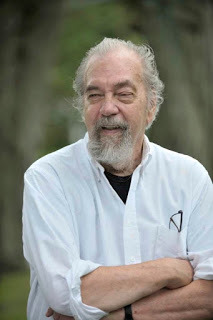
The January 2018 issue of Verse-Virtual.com, the online poetry journal, is dedicated to poet Dick Allen, who passed away on Dec. 26.
"He was an active member of V-V since April 2015," editor Firestone Feinberg states. "A brilliant poet and an extraordinary person, Dick was good, kind, wise, compassionate— and so much more — a man full of love and care not only for his family and friends but for humanity itself."
When I became a contributing editor for the online journal -- which essentially means somebody who contributes poems every month and tries to pay attention to what the other poets are writing -- I did not know who Dick Allen, Poet Laureate of the state of Connecticut from 2010 to 2015, was. That's a sign of how little I know about who's who in American poetry today.
Lots of other poets, including contributors to Verse-Virtual, were not only familiar with Dick Allen's work, but regarded him as an influence on their work, and in some cases as a mentor.
The comments I'm summarizing below come from the "tributes" page in the January issue.
Poet Sydney Lea first encountered Dick's work in the 70s. He notes a guiding principle throughout his many volumes:
"the notion that the most important realities lie behind the scrim of preoccupations, anxieties, and aspirations that we all experience. I will hold Dick– and on my better days, his example– close to my heart for as long as I tread the earth. R.I.P., good man."
Poet Judy Kronenfield did not know him personally, but treasured his poems.
"His poetry is steeped in and has totally absorbed literary tradition, but wears it lightly, and for his own purposes..."
She quotes from his poem "Then":
When the “white horse” comes “galloping toward us,” there is “No road / of words we might take”...
John Stanizzi was one of the poets who regarded Dick Allen as a role model and influence:
"Dick's name was the name in poetry in Connecticut. Every young, aspiring poet around these parts was well aware of the presence of this great artist, and if he were reading somewhere, we (my gang of juvenile poets and me), would find a way to be there."
Verse-Virtual contributing editor Barbara Crooker is an example of a poet that Dick Allen reached out to. She writes that she was "awed by his brilliance" and his attention to other writers.
"He was unfailing in his kindness to me, sending notes when I had a poem appear on The Writer’s Almanac, Verse Daily, etc. Later, he asked if he could be my mentor, something that those of us outside the loop of MFA programs never get to have." I have to admit to knowing what Barbara means by being "outside the loop."
You can find these and many other tributes at this link:
http://www.verse-virtual.com/tributes...
And here's the poem that Dick Allen sent to Verse-Virtual for publication in the current issue. In both the technical stuff, its deft handling of a rhyming structure, and meaning -- speaking to us in words we need to hear -- "Quagmire" typifies the value of his art.
In his note on the poem, Dick said that he wrote it
"considerably before the Trump administration, as a poem that would apply to almost any quagmire individuals or the nation might have entered. But it may seem most appropriate now, in these deranged times."
Quagmire
In it, we try to walk and talk
at the same time:
steps and words, steps and words
so undermined
nothing seems safe, no way seems out,
mud lies everywhere,
and the stink of the place, the shiftiness of it,
its murky air.
Do we crawl back? Do we muck on,
slosh to one side?
Left seems right and right seems left.
Nothing’s verified.
Had we found clear rivers, we
could follow how they run;
had we talked the clouds apart
we could trail the sun.
But swamp and marsh and bog and fen
stretch all around.
The buzzard’s on the crooked branch
and there’s no high ground.
-This Shadowy Place: New Poems (St. Augustine’s Press)
Published on January 04, 2018 20:06
December 31, 2017
Dec. 31, 2017 Is the Seventh Day of Christmas: Remember, There Are Twelve
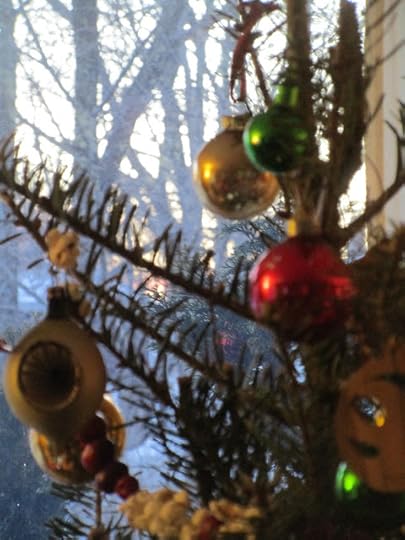
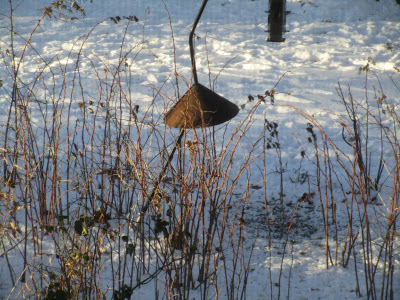 Christmas is only half over. Today may be the last day of the year 2017, but it's only the seventh day of Christmas. As the song says, those days number twelve.
Christmas is only half over. Today may be the last day of the year 2017, but it's only the seventh day of Christmas. As the song says, those days number twelve.
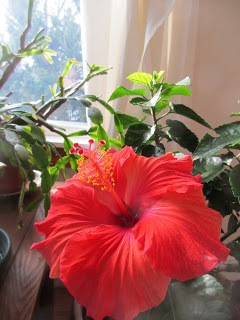
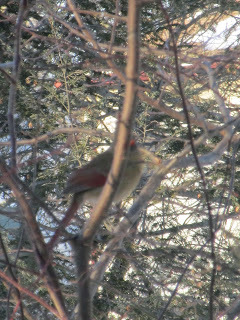 The first day of Christmas did not begin auspiciously. A brief flurry was in the forecast, with some more substantial snow, maybe a few inches, predicted for further south. But just as we were finishing breakfast and packing for the mid-morning drive to make a ferry reservation to cross the Long Island Sound, the sky clouded over and those brief flurries turned into a blizzard. I have subsequently been assured that this was "a fast-moving storm." And in fact about the time I had given up on that ferry reservation and re-centered our hopes on finding an unreserved spot on a later ferry, the puffball snow drop shut off as if someone had turned a spigot and the sun came out to take a good look at the sky's recent accomplishment. "We're going!" I announced. Making the reservation might be a long shot: It's a two and a half hour dash under normal conditions, and the interstates might not be fully plowed, or plowed at all. But -- as I said -- it had stopped snowing. The highways were far from fully plowed, at one point we were trapped behind a trio of enormous snow removal tractors, one for each lane. And even when we had left the snow zone behind (Connecticut barely had a sugaring), the traffic that had been unable to get off early as planned because of the snow -- like us-- was now jousting for road room. When we reached the Bridgeport exit, I declared an optional traffic-laws zone, ignored a half dozen red lights, and arrived at check-in only a few minutes late. With the ferry still at the dock, I was told by a kid with a radio to get in line -- behind people who did not have reservations. "But we have a reservation!" "You're late." "There was a snowstorm in Massachusetts." "You're way over the cut-off time." Cut-off time? The phrase was new to me. Is that the time when I cut off your ear? Somehow we made it onto the boat, the last of the small cars in the small-car spaces, our back bumper licking salt from the Long Island Sound. We didn't rock the boat, but the boat rocked us, lifting its flanks to the sky from the swells produced by that fast-moving storm. Still, we reached our destination, had a great Christmas dinner, sang the old songs... And his was only the first day of Christmas. What was the day like? It was sort of like a partridge in a pear tree. On the second day of Christmas we drove from Suffolk County on Long Island to Riverdale, at the northern tip of the City of New York. My son driving, it was pretty much a vacation day for me. Anne's parents were waiting for us, perched in their comfortable armchairs like two turtle doves. We 'ordered in' for dinner -- is that the expression? the other expression is 'nobody cooks in New York City' -- from a Chinese restaurant and a sushi place. I have noticed that no group of American diners numbering more than two (and some fewer) can agree on eating the same thing. A couple of years ago we watched an endless parade of bike-riding delivery guys streaking down Lexington Avenue to bring Saturday night chow to all the apartments on the East Side. For entertainment we watched, for maybe the 20th time, an incredibly sweet and clever short film version of Dylan Thomas's incredibly nostalgic and brilliant memoir, "A Child's Christmas in Wales." Sometimes family groups are able to watch the same thing. On the third day of Christmas (and the second day in Riverdale) a longtime family friend of my wife's clan, a world traveler and bearer of tidings, paid a holiday call to Anne's parents. A trio of their house guests, my wife, daughter and self sat in on our visitor's this state of the world and brooded over this mixed report (families growing; cities sinking) like -- you've guessed it -- three French hens. On the fourth day we were on the road again. Departing New York after the morning commute but not quite soon enough, we arrived back in the Boston sphere of commuter influence at an hour early enough, one would hope -- especially on Christmas week! -- to escape the 'evening' commute. But no, evening starts early (well before the hasty departure of the winter sun), and plenty of that metro-traffic was waiting for us. We arrived home in time to feel the deep New England freeze, and I was surprised to find the bird feeder not completely empty. If there were four calling birds about, I did not see them. On the fifth day of Christmas, we went back to our routine, a day of work and a visit to the gym afterwards,even though the ancient course of the holiday still had a week to run. What did we have to show for the day? Five gold coins? On the sixth day of Christmas, the weekend had arrived so we did not work, but the glowering sky and the persistent cold kept us from whatever festivities might be on offer. Our outings were of the accumulative short. Between shopping for our screen appetites, movies and TV series at the library, and healthy food at the expensive food store, I have no doubt we acquired the equivalent of six geese-a-laying. Actually, we roasted one of them for dinner. On the seventh day, the punishing and enduring cold promises to have us once more swimming upstream. Not only is today Sunday , but the widely celebrated folk holiday of New Year's Eve, so we venture forth despite the cold to dine with a friend. With our children absent, that still leaves us four swans short of the necessary social swim. I suspect, however, if we watch the silly descent of the infamous ball, there among the crowd we will find our swans swimming along nicely, their long graceful necks pointing to the future, assured of their personal charms, and their happy white tails trailing obediently behind.
The first day of Christmas did not begin auspiciously. A brief flurry was in the forecast, with some more substantial snow, maybe a few inches, predicted for further south. But just as we were finishing breakfast and packing for the mid-morning drive to make a ferry reservation to cross the Long Island Sound, the sky clouded over and those brief flurries turned into a blizzard. I have subsequently been assured that this was "a fast-moving storm." And in fact about the time I had given up on that ferry reservation and re-centered our hopes on finding an unreserved spot on a later ferry, the puffball snow drop shut off as if someone had turned a spigot and the sun came out to take a good look at the sky's recent accomplishment. "We're going!" I announced. Making the reservation might be a long shot: It's a two and a half hour dash under normal conditions, and the interstates might not be fully plowed, or plowed at all. But -- as I said -- it had stopped snowing. The highways were far from fully plowed, at one point we were trapped behind a trio of enormous snow removal tractors, one for each lane. And even when we had left the snow zone behind (Connecticut barely had a sugaring), the traffic that had been unable to get off early as planned because of the snow -- like us-- was now jousting for road room. When we reached the Bridgeport exit, I declared an optional traffic-laws zone, ignored a half dozen red lights, and arrived at check-in only a few minutes late. With the ferry still at the dock, I was told by a kid with a radio to get in line -- behind people who did not have reservations. "But we have a reservation!" "You're late." "There was a snowstorm in Massachusetts." "You're way over the cut-off time." Cut-off time? The phrase was new to me. Is that the time when I cut off your ear? Somehow we made it onto the boat, the last of the small cars in the small-car spaces, our back bumper licking salt from the Long Island Sound. We didn't rock the boat, but the boat rocked us, lifting its flanks to the sky from the swells produced by that fast-moving storm. Still, we reached our destination, had a great Christmas dinner, sang the old songs... And his was only the first day of Christmas. What was the day like? It was sort of like a partridge in a pear tree. On the second day of Christmas we drove from Suffolk County on Long Island to Riverdale, at the northern tip of the City of New York. My son driving, it was pretty much a vacation day for me. Anne's parents were waiting for us, perched in their comfortable armchairs like two turtle doves. We 'ordered in' for dinner -- is that the expression? the other expression is 'nobody cooks in New York City' -- from a Chinese restaurant and a sushi place. I have noticed that no group of American diners numbering more than two (and some fewer) can agree on eating the same thing. A couple of years ago we watched an endless parade of bike-riding delivery guys streaking down Lexington Avenue to bring Saturday night chow to all the apartments on the East Side. For entertainment we watched, for maybe the 20th time, an incredibly sweet and clever short film version of Dylan Thomas's incredibly nostalgic and brilliant memoir, "A Child's Christmas in Wales." Sometimes family groups are able to watch the same thing. On the third day of Christmas (and the second day in Riverdale) a longtime family friend of my wife's clan, a world traveler and bearer of tidings, paid a holiday call to Anne's parents. A trio of their house guests, my wife, daughter and self sat in on our visitor's this state of the world and brooded over this mixed report (families growing; cities sinking) like -- you've guessed it -- three French hens. On the fourth day we were on the road again. Departing New York after the morning commute but not quite soon enough, we arrived back in the Boston sphere of commuter influence at an hour early enough, one would hope -- especially on Christmas week! -- to escape the 'evening' commute. But no, evening starts early (well before the hasty departure of the winter sun), and plenty of that metro-traffic was waiting for us. We arrived home in time to feel the deep New England freeze, and I was surprised to find the bird feeder not completely empty. If there were four calling birds about, I did not see them. On the fifth day of Christmas, we went back to our routine, a day of work and a visit to the gym afterwards,even though the ancient course of the holiday still had a week to run. What did we have to show for the day? Five gold coins? On the sixth day of Christmas, the weekend had arrived so we did not work, but the glowering sky and the persistent cold kept us from whatever festivities might be on offer. Our outings were of the accumulative short. Between shopping for our screen appetites, movies and TV series at the library, and healthy food at the expensive food store, I have no doubt we acquired the equivalent of six geese-a-laying. Actually, we roasted one of them for dinner. On the seventh day, the punishing and enduring cold promises to have us once more swimming upstream. Not only is today Sunday , but the widely celebrated folk holiday of New Year's Eve, so we venture forth despite the cold to dine with a friend. With our children absent, that still leaves us four swans short of the necessary social swim. I suspect, however, if we watch the silly descent of the infamous ball, there among the crowd we will find our swans swimming along nicely, their long graceful necks pointing to the future, assured of their personal charms, and their happy white tails trailing obediently behind.
Published on December 31, 2017 22:04
The Garden of the Seasons: The Twelve Days of Christmas
Christmas is only half over. Today may be the last day of the year 2017, but it's only the seventh day of Christmas. As the song says, those days number twelve. The first day of Christmas did not begin auspiciously. A brief flurry was in the forecast, with some more substantial snow, maybe a few inches, predicted for further south. But just as we were finishing breakfast and packing for the mid-morning drive to make a ferry reservation to cross the Long Island Sound, the sky clouded over and those brief flurries turned into a blizzard. I have subsequently been assured that this was "a fast-moving storm." And in fact about the time I had given up on that ferry reservation and re-centered our hopes on finding an unreserved spot on a later ferry, the puffball snow drop shut off as if someone had turned a spigot and the sun came out to take a good look at the sky's recent accomplishment. "We're going!" I announced. Making the reservation might be a longshot: It's a two and a half hour dash under normal conditions, and the interstates might not be fully plowed, or plowed at all, but -- as I said -- it had stopped snowing. The highways were far from fully plowed, at one point we were trapped behind a trio of enormous snow removal tractors, one for each lane. And even when we had left the snow zone behind (Connecticut barely had a sugaring), the traffic that had been unable to get off early as planned because of the snow -- like us-- was now jousting for road room. When we reached the Bridgeport exit, I declared an optional traffic-laws zone, ignored a half dozen red lights, and arrived at check-in only a few minutes late. With the ferry still at the dock, I was told by a kid with a radio to get in line -- behind people who did not have reservations. "But we have a reservation!" "You're late." "There was a snowstorm in Massachusetts." "You're way over the cut-off time." Cut-off time? The phrase was new to me. Is that the time when I cut off your ear? Somehow we made it onto the boat, the last of the small cars in the small-car spaces, our back bumper licking salt from the Long Island Sound. We didn't rock the boat, but the boat rocked us, lifting its flanks to the sky from the swells produced by that fast-moving storm. Still, we reached our destination, had a great Christmas dinner, sang the old songs... And his was only the first day of Christmas. What was the day like? It was sort of like a partridge in a pear tree. On the second day of Christmas we drove from Suffolk County on Long Island to Riverdale, at the northern tip of the City of New York. My son driving, it was pretty much a vacation day for me. Anne's parents were waiting for us, perched in their comfortable armchairs like two turtle doves. We 'ordered in' for dinner -- is that the expression? the other expression is 'nobody cooks in New York City' -- from a Chinese restaurant and a sushi place. I have noticed that no group of American diners numbering more than two (and some fewer) can agree on eating the same thing. A couple of years ago we watched an endless parade of bike-riding delivery guys streaking down Lexington Avenue to bring Saturday night chow to all the apartments on the East Side. For entertainment we watched, for maybe the 20th time, an incredibly sweet and clever short film version of Dylan Thomas's incredibly nostalgic and brilliant memoir, "A Child's Christmas in Wales." Sometimes family groups are able to watch the same thing. On the third day of Christmas (and the second day in Riverdale) a longtime family friend of my wife's clan, a world traveler and bearer of tidings, paid a holiday call to Anne's parents. A trio of their house guests, my wife, daughter and self sat in on our visitor's this state of the world and brooded over this mixed report (families growing; cities sinking) like -- you've guessed it -- three French hens. On the fourth day we were on the road again. Departing New York after the morning commute but not quite soon enough, we arrived back in the Boston sphere of commuter influence at an hour early enough, one would hope -- especially on Christmas week! -- to escape the 'evening' commute. But no, evening starts early (well before the hasty departure of the winter sun), and plenty of that metro-traffic was waiting for us. We arrived home in time to feel the deep New England freeze, and I was surprised to find the bird feeder not completely empty. If there were four calling birds about, I did not see them. On the fifth day of Christmas, we went back to our routine, a day of work and a visit to the gym afterwards,even though the ancient course of the holiday still had a week to run. What did we have to show for the day? Five gold coins? On the sixth day of Christmas, the weekend had arrived so we did not work, but the glowering sky and the persistent cold kept us from whatever festivities might be on offer. Our outings were of the accumulative short. Between shopping for our screen appetites, movies and TV series at the library, and healthy food at the expensive food store, I have no doubt we acquired the equivalent of six geese-a-laying. Actually, we roasted one of them for dinner. On the seventh day, the punishing and enduring cold promises to have us once more swimming upstream. Not only is today Sunday , but the widely celebrated folk holiday of New Year's Eve, so we venture forth despite the cold to dine with a friend. With our children absent, that still leaves us four swans short of the necessary social swim. I suspect, however, if we watch the silly descent of the infamous ball, there among the crowd we will find our swans swimming along nicely, their long graceful necks pointing to the future, assured of their personal charms, and their happy white tails trailing obediently behind.
Published on December 31, 2017 22:04
December 30, 2017
The Garden of Eternal Voices: Poet Dick Allen Passed Away on Christmas. We'll All Miss Him
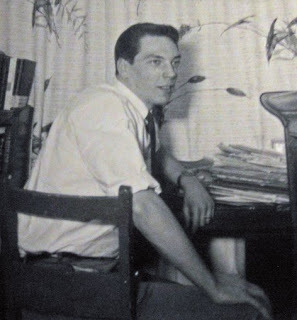
We never met face to face, but over the last couple of years Dick
Allen's poetry and emails meant a lot to me. I was very grateful for and encouraged by his comments on my work. And I loved both the skill and humanity, and the wisdom, in his poems. I felt he had a true, deep ear for the lives of others and the song of life we are all part of. And a wonderful touch with the registers of the American language.
Dick Allen suffered a heart attack at his home in Connecticut on Christmas and died the next day, at age 78. He was poet laureate of the state of Connecticut from 2010 to 2015 and one of the regular contributors to Verse-Virtual.com, the online poetry journal and community I became a member of two years ago.
I don't know how many poetry books Dick published. In his bio on Verse-Virtual, he notes the last two, "Zen Master Poems" published last year, and "This Shadowy Place: Poems," published in 2014 and awarded the New Criterion Poetry Award for works concentrating on traditional forms. He described his life this way: "Now, my wife and I quietly write poetry by the shores of Thrushwood Lake, in Connecticut, and struggle daily to find calm in these surreal days."
I didn't know who he was when I sent him a note pointing out what I liked about a poem he published on Verse-Virtual. If I had known, I probably wouldn't have taken the initiative. Clearly Dick Allen did not need to hear the virtues of his poem explained by me. Nevertheless, he responded in a collegial and kindly manner, and so I made it a habit every few months of initiating email exchanges about our poems.
I didn't realize that everybody else who published regularly in Verse-Virtual was likely doing the same thing. Somehow he found time for all of us.
Verse-Virtual editor Firestone Feinberg has solicited comments and tributes from poets who knew Dick Allen or, like me, developed an email relationship. He plans to publish these in an upcoming edition of the online journal. Here is what Firestone had to say about Dick:
A brilliant poet and an extraordinary person, Dick was good, kind, wise, compassionate — and so much more — a man full of love and care not only for his family and friends but for humanity itself.
A letter written by Dick Allen's daughter about her father was published by the Hartford Courant. You can find that here:
http://www.courant.com/opinion/insigh...
Finally, a poem, originally published in "Poetry" magazine and later in Verse-Virtual.
Almost Nowhere in the World, as Far as Anyone Can Tell
It is pleasant, very pleasant, to sit at a wooden boothsurrounded by parrots, wheels, right-turning conch shells,the victory banner and the endless knot,the lotus, the treasure vase, the golden fishes--is this not so? Is it not pleasantto sip Tsingtao beer, or Zhujiang, or Yanjing,and tap your fingers on the bamboo mats?After we’ve drunk enough, there will be Buddhist Delight,Mongolian beef side dishes, a whole host of sauces,even some pizza and chicken wings if children are present,as well as the small ice-cream machine, lotus paste, pears,smiles and bows all around. It is pleasant, is it not,to linger outside the door that opens to the parking lotof this small strip mall beside this secondary roadand look upon the scattered cars all come to rest here
After the Newtown school shooting in Connecticut he wrote a poem titled "Solace." The final stanza reads:
No voice once heard is ever lost
In the snow lightly falling.
In the snow lightly falling,
No voice once heard is ever lost.
Many other poems can be found at Dick Allen's website and blog: https://zenpoemszenphotosdickallen.net
Published on December 30, 2017 10:27
December 20, 2017
The Garden of Verse: Confessions, Commentaries and Some Home Truths in Young Poems
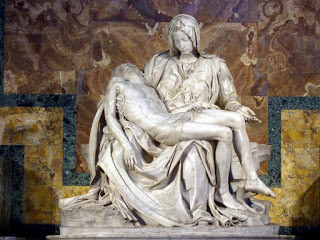
My thoughts on some poems that speak truth and summon memory in the December issue of Verse-Virtual: "Botched Job" by Donna Reis employs the structural device of using the key words in the second line of a stanza to build the first line of next stanza. Along with rhyme and other kinds of repeats, the music of this poem blows like a chilly wind through the stages of a painful tale of a spouse's manipulative cry for attention. I can almost hear a sad Spanish guitar between the stanzas. A very affecting poem.
Poet Ceri Eagling watches the world in her "Reflections," a poem based on a Paris street scene:
Madame wields her shopping basket like a weapon
splitting the knots of Brits who picked the Sunday market
option over the Château on their visit to Versailles.
In a back-handed tribute to her worldliness, those 'Brits' dismiss Madame's discourtesy as "a case of bloody Gallic cheek " -- one of those wonderfully tangy phrases that could only come from England's English. The sharp-eyed poet tells us that the tourists are choosing that interpretation over "the craven
tribute paid to crabbed old age." I think I will remember that 'crabbed old age' and remind myself not to be crabby.
In what we may safely call a confessional poem given its title "On the Drive Home from the Jolly Party a Young Mother Confesses," Donna Hilbert offers a riveting vignette with an enduring message. After the 'young mother' confesses the heavy consequences of "no sex education" on her thwarted ambitions, the men in the car turn to stone, and the car's other young mother reveals that "her candor scares me." Readers may meditate on whose confession is referenced by the title.
Many of the poems in the December issue of Verse-Virtual connect to the theme of early works. It's hard to believe that many of these were written so young. Kate Sontag's evocative poem "Scenes from an Apartment in Hollywood (with Dogs)" tells how the blue hour enters
through the balcony windows
like a silent screen hero
from across the boulevard
and slowly blackens for stars
The poems captures the way certain experiences go so deeply when you're young. I still notice the 'blue hour' of fading light and blackening silhouettes as sunset fades to darkness, but I think those hours were even bluer back then.
David Graham's "The Elusive American," written when the poet was 20, creates a lasting impression of a famous American character out of biographical research and empathetic intuition: Harry Houdini, who knew that all the world was a stage and he always belonged at its center. The illusionist, as the poet tells us, ... knew the counterfeit ease of a hustler in rented clothes
but walked through walls anyway
and when his mother smiled turned muscles to keys,
his devotion dissolving knots into rags...
The poem captures the revealing peculiarities and the enduring elusiveness of this great escape artist. The poet was young, but there is nothing 'young' about the poem.
Joan Colby contributes the first 'Clio poem she wrote as a young woman: "Ah Clio -- Muse of History." The muse of history is surely a winning notion for poems, and this poem suggests its universal appeal, as we run into ClioWalking all the breakwaters and levees
On observation decks staring
Out over all cities, chewing gum
In every Mobile comfort station,
Washing your hands.
Mary McCarthy's "Madonna Song," written in the poet's twenties, imagines a commitment to great age, personal time merging with creation itself. As in the memorable lines: I will be patient as stone
until wild men come
to beat war dances
on my bones
In her youthful poem "The Scene," Tricia Knoll connects The Pieta to the tragedy of a contemporary war. In the black silken lap of Meurtra La Fois
Lies the drooling quiet head of Cornelius, her son,
Whose eyes slowly spin in rhythm
With the gray curls of his dusty hair.
Unhappily, the lesson of this youthful poem is no less relevant today. You can read the rest of these poems and many others at
http://www.verse-virtual.com/poems-an...
Published on December 20, 2017 14:22
December 15, 2017
The Garden of the Seasons: Home for the Holidays, the Travel, the Over-stimulation, the Roadwork... Can't Wait!
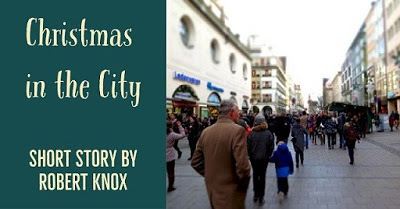
My Christmas story "Christmas in the City" -- Christmas season story, actually -- is up this week on Beneaththerainbow.com, a busy online story journal that's becoming one of my favorite sites. The story has a lot of traveling in it. If you're a couple you go to see one partner's family, then the other's. If the two families live reasonably close to one another, both in the New York City area, say, you try to do all the traveling and visiting in one trip. It's a question of how much "relativity" can you pack into a few days.
Here's the beginning of the story:
On the night before the night before Christmas we drove down from our home by the ocean through the rain forest of Connecticut, watching the sky turn to moist, violet hues as we pushed into the ambient light pollution of denser realms. Human settlements: cars and houses and shopping centers. The rain passed, we were home free, or so we thought, but somebody had reorganized the highway since our last visit and we found ourselves staring the Tappan Zee Bridge in the ominous face before choosing the desperate extremity of “last exit.” Last exit deposited us into a bedroom community where Santa tiptoed on cat paws, but neither of us had ever set foot.
“Hastings-on-Hudson,” I marveled. “What kind of a name is Hastings-on-Hudson? If you see Jacob Marley hitchhiking, don’t pick him up.”
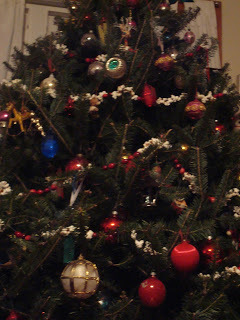 The story includes my take on what the news media insisted on calling "the December Dilemma." The tired premise for these Living Page feature stories is that Jewish-Christian interfaith families are supposed to have difficulties deciding which of the December holiday traditions to follow. Do we celebrate Christmas or Hanukkah? Whose family should we visit, your Jewish one with those nine-candle Menorahs and that funny-sounding prayer? Or my Christian one, with my non-churchgoing Dad, the live tree in your living room with all those colored lights, and the December electric bill from all that extra lighting?
The story includes my take on what the news media insisted on calling "the December Dilemma." The tired premise for these Living Page feature stories is that Jewish-Christian interfaith families are supposed to have difficulties deciding which of the December holiday traditions to follow. Do we celebrate Christmas or Hanukkah? Whose family should we visit, your Jewish one with those nine-candle Menorahs and that funny-sounding prayer? Or my Christian one, with my non-churchgoing Dad, the live tree in your living room with all those colored lights, and the December electric bill from all that extra lighting?Seriously, folks, where's the dilemma? We do them both, naturally. The kids get more presents, more candy, more attention from the grandparents.
The parents get to drive all over creation, going from one house to another, taking in the sights in Midtown, Rockefeller Center and the Metropolitan Museum. Christmas dinner and carol singing on Long Island. My wife, as "Christmas in the City" points out
...hates the December Dilemma. We solved the so-called, over-hyped bi-religious dilemma at home by putting the Hanukkah candles in the dining room and the sacrificial tree, symbolical axis mundi of the pagan solstice festival, in the living room. The kids get twice as many presents. We eat latkes on the first night of Hanukkah, seasoned with a little blood via hand-grating the potatoes. We exchange Christmas presents some evening, or morning (never on December twenty-fifth), whenever it’s convenient to our travel schedule. We travel to nostalgic New York to spend the day of days with my parents in the house where I grew up and seem unable to get away from, at least far enough to have an excuse not to go there for Christmas. But we also go to the Bronx, to see Sharon’s parents and watch a video treatment of “A Child’s Christmas in Wales,” which is exempted from Sharon’s core values because it goes beyond mere warm-and-wonderful nostalgic to non-denominationally entertaining. So she says. Actually, I think she’s jealous.
As one of our friends pointed out after reading "Christmas in the City," the story is really a disguised memoir with "the names changed to protect the innocent."
Yes, it is. You'll note that my name is on it, because I'm not one of the innocent. I'm the perpetrator. I wrote the story about ten years ago. It was fun to see it again.
To read the rest of it, go to:
http://beneaththerainbow.com/christma...
Published on December 15, 2017 22:20
December 13, 2017
The Garden of Honey Bee: Pass the Dandelions, Please
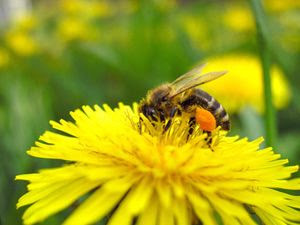
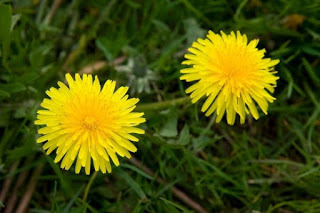 This is the time of the year if you live in the northern half of the United States, or anywhere in the northern hemisphere, to remind yourself that the sun will return, the light will lengthen, plants will pop up out of the earth spontaneously (I know I didn't plant them all), the green will return to the trees, and the color to lawns and gardens. Also birds will sing and bees will buzz.
This is the time of the year if you live in the northern half of the United States, or anywhere in the northern hemisphere, to remind yourself that the sun will return, the light will lengthen, plants will pop up out of the earth spontaneously (I know I didn't plant them all), the green will return to the trees, and the color to lawns and gardens. Also birds will sing and bees will buzz. Or will they? The last item on this happy roll call of nature's bounties has been the least certain of earth's annual bounties in recent years because of a frightening loss of bee population, almost certainly related to the use of chemical fertilizers, called "colony collapse disorder." Bees are not primarily the nuisance creatures that we worried about stepping on in our bare feet, during the unsteady paradise of childhood. They are an essential partner in human food production. Bees pollinate fruit trees, nut crops, berries, and many other of the plant foods we rely on. After writing that sentence I wondered how many so I looked up www://honeylove.org/list-of-food/ and found... Alfalfa Okra Strawberries Onions Cashews Cactus Prickly Pear Apricots Allspice Avocados Passion Fruit Lima Beans Kidney Beans Adzuki Beans Green Beans and.... The list rolls down the screen -- and down and down and down... My finger grow tired scrolling. I literally cannot count them all. A few other favorites that catch my eye: mangoes, lemons, carrots, coffee -- what was that last one? Coffee? Has everyone got the point? Now let's focus on another item on the happy-thoughts-of-spring agenda, the category of common wild plants found, in field, farm, residential yards and public lawns that are abused under the misapprehension that they are "weeds." A weed, of course, is merely a plant in a place where we don't wish it to be. The word has no scientific definition. One of the most widely victimized of these wild common plants, under the libel of 'weed,' is the common dandelion. Given the problematic decline of honey bees, it's time to turn our attention on the role of the dandelion in the 'balance of nature.' Writing a couple springs ago, Kate Bradbury of the newspaper The Guardian put the case this way: "A few weeks ago I walked past a lawn which hadn’t yet had its first spring cut. It was awash with bright yellow dandelions, and each one was peppered with several pollen beetles, perhaps enjoying their first meal of the year. A week later the dandelions were buzzing with bees, but a few days after that, this little patch of wildflowers had been razed – what happened to the pollen beetles and the bees?" [https://www.theguardian.com/lifeandst...] Experts on the subject tell us dandelions are simply the honey bee's most important spring flower. In fact beekeepers traditionally look to the timing of dandelion season as an important marker of honeybee success. After a hive survives the winter, as the beekeeper surely hopes it does, the keeper knows the bees won't starve if they can manage to hang on until dandelions bloom in early springs. That means May, in Massachusetts, with some early starters hoisting those yellow petals in April. "Each flower consists of up to 100 florets, each one packed with nectar and pollen," Bradbury writes. "This early, easily available source of food is a lifesaver for pollinators in spring." Dandelions are a lifeline for honey bees, whose continued survival largely depends on wild flowers. Unfortunately,in the minds of many property owners dandelions are seen as the enemy of the perfect lawn. And they're a determined and resourceful enemy. Their deep tap roots are hard to remove -- you fail to 'get all of it' and the thing grows back -- and the plant has the ability to plant itself in cracks in the pavement, rock piles, cement walls, or your neighbor's yard, from which stronghold its seeds come wafting back into yours. There's yet another libel from which dandelions suffer. Calling them 'weeds' is bad enough, but some elements of the native-plant police consider them "invasives." Dandelions, and a host of other Old World plant colleagues, arrived in this continent along with the Pilgrims, the Boston Puritans and all the other English-speaking colonists; plus the Dutch, Swedish, German, Scottish and Irish settlers of the European migration. Pointing out that the dandelion had settled in America by 1672, scientist Peter Del Tredici challenged the rigid notion of "invasives" in a recent article in the Boston Globe that raised the idea of "a statute of limitations for plants" that have clearly settled in (along with us) to become part of the local landscape: "Can the ubiquitous dandelion ever achieve native status or will it forever be considered an alien? Adding a layer of complexity to these questions is the fact that modern molecular research has demonstrated than many European weeds have undergone genetic adaptation under North American conditions, and are now measurably distinct from their European ancestors." [www.bostonglobe.com/ideas/2017/11/04/...] He proposes that any plant growing successfully here before 1800 -- wildflowers and herbs like the dandelion, plantain and curly dock, along with basic European imports such as grains, flowering ornamentals, fruit trees and shade trees -- should be considered a naturalized “American archaeophyte.” Plants brought later can be classified as neophytes, he says, and 'non-native' until their statute of limitations is reached. So here's the message for lawn lovers, backyard gardeners, lawn care companies -- lighten up on the weeding. We are all part of a natural inter-dependency: humans, plants, bees, birds, wildflowers, 'weeds.' Your yard is part of some other living thing's habitat. We have all grown up together in North America. Dandelions have been here since 1672. They are as native as we are, part of the American landscape. And honey bees, who have adapted to their presence, depend on them. Just as we depend on bees.
Published on December 13, 2017 12:37
December 8, 2017
The Garden of Verse: My Poem in a Beautiful Book; A Memory of Spring
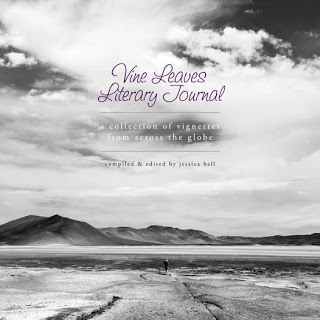
I have an Easter poem, titled "A Certain Day in Spring," in the recently published final edition of Vine Leaves Literary Journal, a journal closing its six-year run with a beautifully designed coffee table hardcover issue.
The book is over 200 pages and includes literally hundreds of full-color illustrations, plus something over 200 poems and "vignettes."
I'm very happy to have a poem of mine included in his hardcover book. The only downside is that the book, given its size and lavish use of color and art has a high price, at $60.
The full title is "Vine leaves Literary Journal: A Collection of Vignettes From Across the Globe," compiled and edited by Jessica Bell. Here's a link to the publisher's site:
http://www.vineleavespress.com/vine-l...
Since the contents of the book are not available online, I'll post my poem here:
A Certain Day In Spring
I cry in the same place every year I remember to bring tissues, but I don't remember whyWe are called upon to respect others The minister, recalling an incident involving her wife and their child explodes the canon of pronounsWe breathe the fragrance of potted pink hyacinthsPeople older than us shamelessly singing choruses of 'Hallelujah!'
At night I strive to recall the wisest of all her sayings.'the sacrament of tears'I listen to songs named 'Two Souls,' 'Sacred Nature,' 'My Brother's Keeper.'Isaac turns in a slow circle, expectantly for the ramNow we will live forever
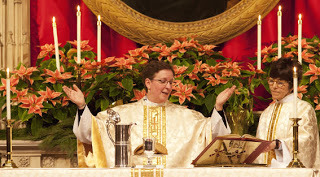 The minister referred to here is Rev. Pamela L. Werntz, Rector at Emmanuel Church, an Episcopal church in Boston. Her Easter sermons are a revelation.
The minister referred to here is Rev. Pamela L. Werntz, Rector at Emmanuel Church, an Episcopal church in Boston. Her Easter sermons are a revelation.
Published on December 08, 2017 21:45



